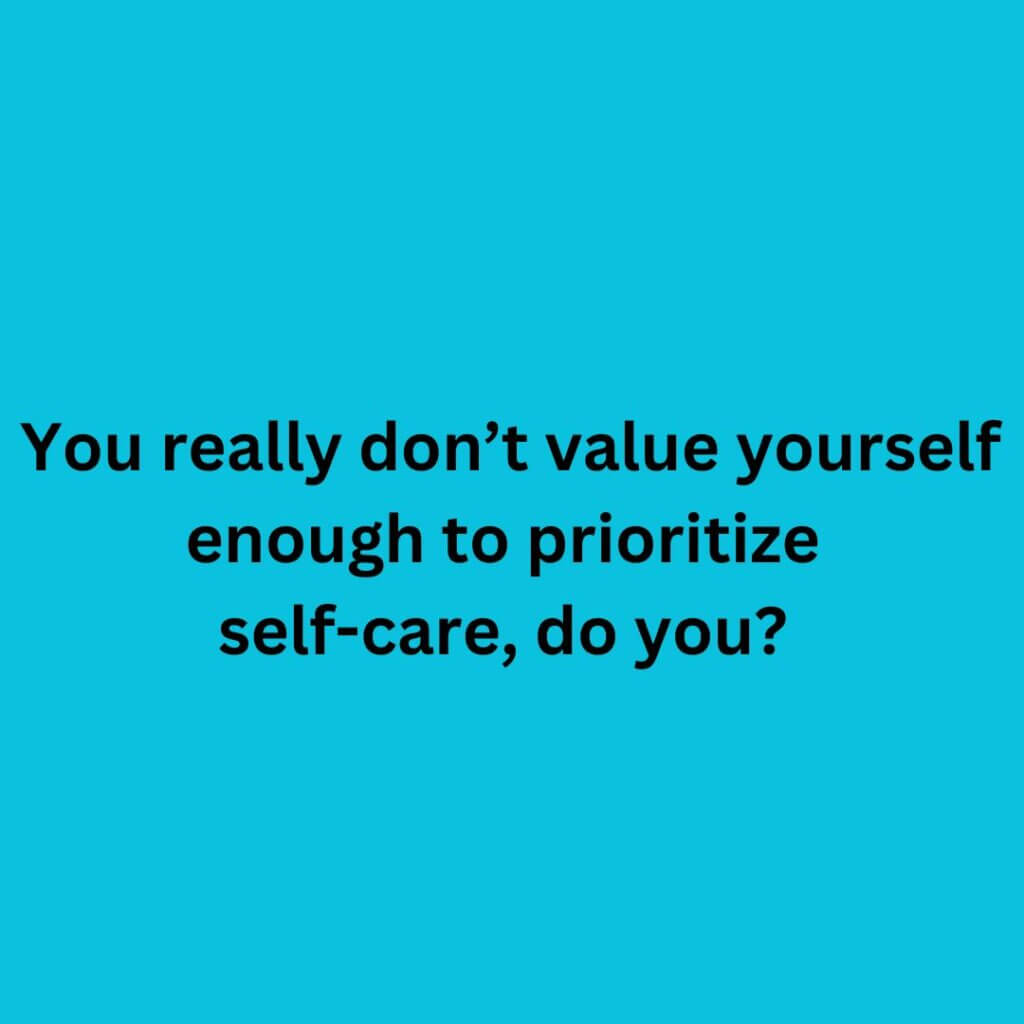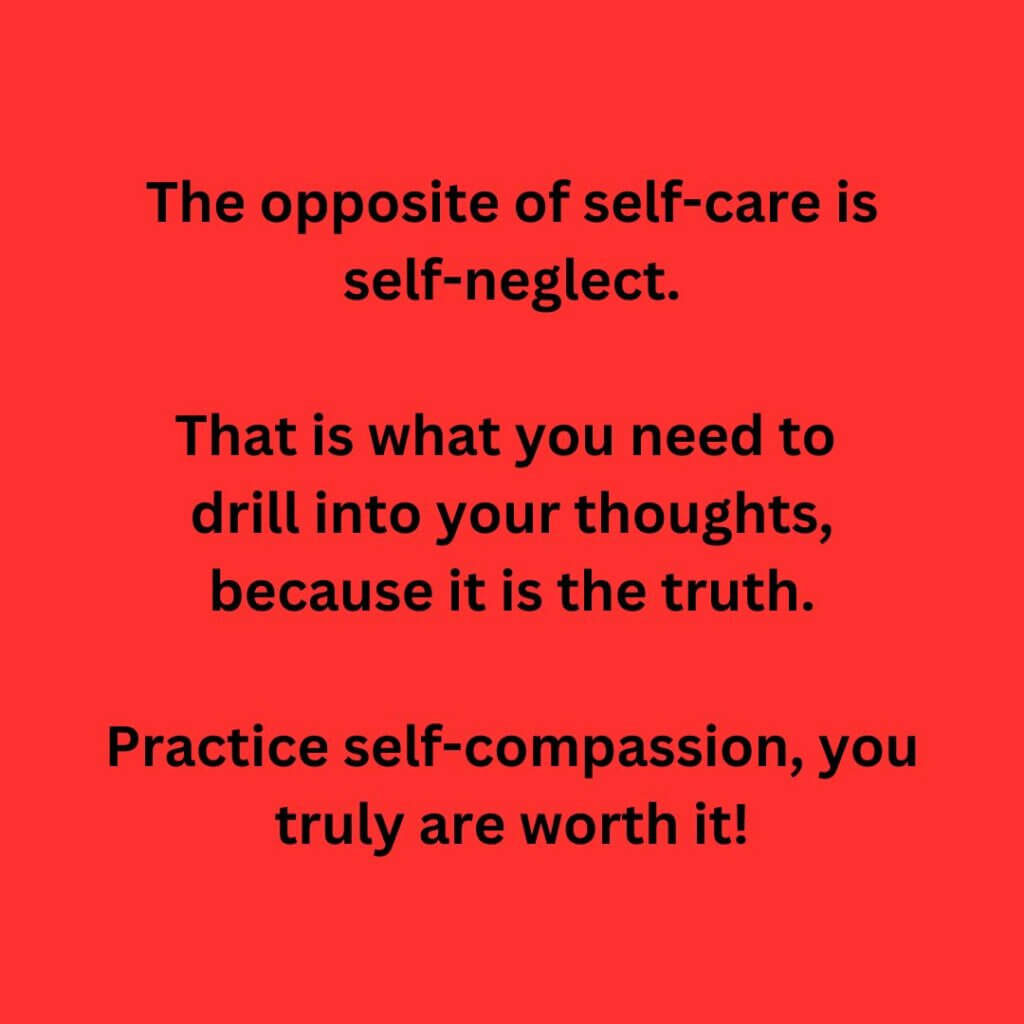
Prevention and regular maintenance is good for your car and it is good for your body and mind too. There will never be enough time. The difficulty and the turmoil arise when we know what we “should” do and want to do for our own health but we do not do it! There will be times when you have to make the decision to do what you know is best, no matter how you feel. Write it down, schedule it, and then do it. and do it consistently. Consistently is your word for the month and 78 will become your number.
1. Understanding caregiver burnout and its impact on physical and mental health
Caregiver burnout is a real concern that arises from the prolonged stress and strain of caring for others without taking enough time for self-care. It is a state of physical, mental, and emotional exhaustion that can have detrimental effects on the caregiver’s overall well-being.
Physically, the constant demands of caregiving can lead to exhaustion and fatigue. Lack of proper rest and sleep can weaken the immune system, making caregivers more susceptible to illnesses. Additionally, the physical tasks involved in caregiving, such as lifting, bathing, and assisting with mobility, can put a strain on the caregiver’s body, leading to musculoskeletal issues and chronic pain.
Mentally, caregiver burnout can manifest as feelings of overwhelm, anxiety, and depression. The constant worry and responsibility of ensuring the well-being of another person can take a toll on the caregiver’s mental health. They may experience difficulty concentrating, making decisions, or experiencing frequent mood swings.
The impact of caregiver burnout extends beyond the caregivers themselves. When caregivers are overwhelmed and exhausted, it can affect the quality of care they provide to their loved ones. They may become irritable, impatient, or emotionally distant, which can strain their relationships with the person they are caring for.
Recognizing the signs of caregiver burnout is crucial to prevent it from escalating further. It is important for caregivers to prioritize self-care and seek support from family, friends, or support groups. Taking breaks, engaging in activities that bring joy, and seeking professional help when needed are essential steps in avoiding caregiver burnout.
By understanding the impact of caregiver burnout on physical and mental health, caregivers can take proactive measures to protect their own well-being. Remember, caring for others starts with caring for yourself.

2. Signs and symptoms of caregiver burnout to look out for
When caring for others becomes a full-time responsibility, it’s easy to overlook your own well-being. Caregiver burnout is a real and prevalent issue that can have serious consequences for both the caregiver and the person receiving care. It’s crucial to be aware of the signs and symptoms of caregiver burnout to prevent it from taking a toll on your physical, mental, and emotional health.
One of the most common signs of caregiver burnout is persistent fatigue. You may find yourself feeling exhausted no matter how much rest you get. This exhaustion can be both physical and mental, making it difficult to perform everyday tasks or think clearly. It’s important not to ignore these signs of fatigue and prioritize self-care to replenish your energy levels.
Another symptom to watch out for is increased irritability or mood swings. Caregiving can be a demanding and stressful role, and it’s natural to feel frustrated or overwhelmed at times. However, if you notice that your patience is wearing thin more often than not, or if you’re experiencing frequent mood swings, it may be a sign of burnout. Taking breaks, seeking support from others, and finding healthy outlets for stress can help regulate your emotions and prevent burnout.
Physical symptoms such as headaches, muscle pain, or changes in appetite and sleep patterns can also indicate caregiver burnout. Chronic stress can manifest in various physical ways, and it’s important to listen to your body’s cues. Ignoring these warning signs can lead to more serious health issues in the long run, so it’s essential to prioritize self-care and seek medical attention if needed.
Lastly, social withdrawal or isolation is a common symptom of caregiver burnout. When caregiving becomes all-consuming, it’s easy to neglect your social life and the activities you once enjoyed. Feeling disconnected from friends and family can further exacerbate feelings of stress and burnout. Making an effort to maintain social connections, seek support from others in similar situations, or joining support groups can help combat the sense of isolation and provide a much-needed outlet for emotional support.
Recognizing these signs and symptoms of caregiver burnout is the first step towards preventing it. Taking care of yourself is not selfish, but rather a necessary part of being an effective caregiver. By prioritizing self-care and seeking support when needed, you can ensure that you’re able to provide the best care possible while maintaining your own well-being.
3. The importance of self-care for caregivers
As a caregiver, it’s easy to get caught up in the demands of taking care of others and neglecting your own needs. However, self-care is not only crucial for your own well-being but also for your ability to provide the best care possible for your loved ones.
Taking time for yourself may feel selfish or indulgent, but it is a necessary part of maintaining your physical, emotional, and mental health. When you prioritize self-care, you are better equipped to handle the challenges and responsibilities of caregiving.
Self-care can take many forms, and it’s important to find what works best for you. It could be as simple as taking a few minutes each day to practice deep breathing or meditation. Engaging in activities that bring you joy and relaxation, such as reading a book, going for a walk, or pursuing a hobby, can also be incredibly beneficial.
Also, seeking support from others is an essential part of self-care. Connect with other caregivers who understand the unique challenges you face and can offer guidance, empathy, and encouragement. Consider joining a support group or reaching out to friends and family for help when needed.
Remember that self-care is not a luxury but a necessity. By prioritizing your own well-being, you will be able to provide the best care possible for your loved ones while preventing burnout and maintaining a healthier balance in your life
4. Strategies for preventing caregiver burnout
Preventing caregiver burnout is crucial for both the caregiver’s well-being and the quality of care they provide. It is important to recognize the signs of burnout and take proactive steps to avoid reaching that point. Here are some effective strategies to help prevent caregiver burnout:
1. Prioritize self-care(wellness for yourself): It is easy for caregivers to neglect their own needs while taking care of others. However, self-care is essential for maintaining physical, emotional, and mental well-being. Make time for activities you enjoy, exercise regularly, eat nutritious meals, and get enough sleep. Remember, taking care of yourself is not selfish; it is necessary to be able to provide care to others effectively.
2. Seek support: Reach out for help when needed. Whether it’s family, friends, or support groups, having a network of people who understand and can offer emotional support can make a significant difference. Sharing your experiences, concerns, and frustrations with others who are in similar situations can provide validation and a sense of community.
3. Set boundaries: It is important to establish boundaries and learn to say no when necessary. Understand your limitations and do not feel overly guilty (You will feel a little guilt, so accept it and move forward.) for prioritizing your own well-being. Setting realistic expectations and communicating them with others involved in the caregiving process can help prevent feeling overwhelmed and resentful.
4. Take breaks: Caregiving can be physically and emotionally draining. Schedule regular breaks and respite care to recharge and rejuvenate. Use this time to engage in activities that help you relax and unwind.
5. Practice stress management techniques: Incorporate stress management techniques into your daily routine. This can include deep breathing exercises, meditation, yoga, or engaging in hobbies that help you unwind. Finding healthy outlets for stress can significantly reduce the risk of burnout. These are the same techniques that busy executives, athletes, and hourly workers use to help themselves.
6. Maintain a positive mindset: Caregiving can be challenging, but maintaining a positive mindset can make a significant difference. Focus on the rewarding aspects of caregiving, celebrate small victories, and practice gratitude. Remind yourself of the difference you are making in someone’s life.
By implementing these strategies, caregivers can reduce the risk of burnout and provide better care for their loved ones. Remember, taking care of yourself is not only essential for your own well-being but also for your ability to provide compassionate care to others. I get it, knowing what to do and doing it are two very different things. There will never be enough time and you will never have enough energy so make the decision to do it now and do what you can do.

5. Creating a support system and seeking help when needed
Creating a support system and seeking help when needed is crucial in preventing caregiver burnout. As a caregiver, you may often feel the weight of responsibility and the need to do everything on your own. However, it is important to acknowledge that you cannot do it all alone and that it is okay to ask for assistance. Learning to delegate appropriately will be a great asset to you,
Building a support system starts with reaching out to family and friends who are willing to lend a helping hand. Communicate your needs and concerns with them, and don’t hesitate to ask for their support. They can assist with tasks such as running errands, preparing meals, or providing respite care to give you some time for self-care.
Consider joining support groups or online communities specifically for caregivers. These platforms can provide a safe space to share experiences, seek advice, and receive emotional support from others who are going through similar challenges. Connecting with individuals who understand your situation can be incredibly comforting and empowering.
Seeking professional help is equally important. Reach out to healthcare professionals, therapists, or counselors who specialize in caregiving support. They can provide valuable guidance, coping strategies, and emotional support. Talk therapy is a great tool to help you and the whole family.
Remember, taking care of yourself is essential to provide the best care for your loved one. Prioritize self-care activities that help you relax, rejuvenate, and recharge. This may include activities such as exercise, meditation, practicing hobbies, or spending time with loved ones.
By creating a support system and seeking help when needed, you can alleviate the burden of caregiving and prevent burnout. Remember, you are not alone in this journey, and reaching out for support is a sign of strength, not weakness.
6. The benefits of respite care and taking breaks from caregiving responsibilities
One effective way to prevent caregiver burnout is by incorporating breaks into your caregiving routine. Respite care refers to temporary relief or assistance provided to caregivers, allowing them to take a break from their responsibilities. This break can be as short as a few hours or as long as a few days, depending on the caregiver’s needs.
The benefits of respite care are numerous and significant. Firstly, it offers caregivers an opportunity to recharge and rejuvenate. Caregiving is a demanding role that requires constant attention and care. Taking regular breaks can help caregivers replenish their physical and emotional energy, enabling them to provide better care in the long run.
A hiatus also provides an opportunity for the caregiver to focus on their own needs and well-being. Whether it’s pursuing a hobby, spending time with friends and family, or simply enjoying some alone time, respite care allows caregivers to prioritize themselves without feeling guilty.
Taking a regular rest break can have positive effects on the relationship between the caregiver and the care recipient. Taking breaks from caregiving responsibilities can prevent burnout and reduce the risk of frustration or resentment building up. When caregivers have the chance to recharge, they can approach their role with renewed patience, empathy, and compassion.
There are various options for respite care, depending on the specific needs and preferences of the caregiver and care recipient. It could involve arranging for a trained caregiver to come into the home and take over responsibilities temporarily or opting for short-term stays in respite care facilities. Some communities also offer support groups or programs that provide respite care services.
7. Developing healthy coping mechanisms and managing stress effectively
One effective way to manage stress is to prioritize self-care. It may seem counterintuitive to focus on oneself when caring for others, but taking time to recharge and rejuvenate is essential. Engaging in activities that bring joy and relaxation, such as exercise, meditation, hobbies, or spending time with loved ones, can help reduce stress levels and prevent burnout.
Another important aspect of managing stress is setting realistic expectations. It is natural to want to provide the best care possible, but it is equally important to recognize one’s limitations and ask for help when needed. Delegating tasks, reaching out to support groups or professional caregivers, and seeking respite care can alleviate the burden and prevent overwhelming stress.
Effective communication is also key in managing stress as a caregiver. Expressing concerns, emotions, and needs to trusted individuals, such as family members, friends, or therapists, can provide a sense of relief and support. Additionally, keeping open lines of communication with healthcare professionals involved in the care can ensure that all parties are on the same page and working towards the best outcomes.
Practicing stress-reducing techniques such as deep breathing exercises, mindfulness, or journaling can help caregivers manage their emotions and stay present in the moment. These techniques can provide a sense of calm and clarity amidst the challenges and responsibilities of caregiving.
8. Seeking professional support and counseling for caregiver burnout
Caregiver burnout is a real and serious issue that can have detrimental effects on your physical, mental, and emotional well-being. Recognizing the signs of burnout and seeking professional support and counseling is crucial in preventing and managing caregiver burnout.
Professional support and counseling can provide you with a safe space to express your feelings, frustrations, and concerns. A trained therapist or counselor can help you navigate the complex emotions that come with being a caregiver and provide guidance on self-care strategies. They can also provide valuable resources and techniques for managing stress, setting boundaries, and finding a balance between caregiving and your own needs.
Seeking professional support can help you gain perspective on your caregiving role and provide you with the necessary tools to cope with the challenges that may arise. They can help you develop healthy coping mechanisms, improve communication skills, and offer guidance on how to effectively manage your time and responsibilities.
Remember, seeking professional support and counseling is not a sign of weakness but a proactive step toward maintaining your well-being. Taking care of yourself is not selfish; it is essential for your own health and the quality of care you provide to your loved ones. By seeking professional support, you are investing in your own self-care and ensuring that you can continue to be the best caregiver possible.
If you’re experiencing symptoms of burnout or find yourself struggling to cope with the demands of caregiving, don’t hesitate to reach out to a professional who can provide the support and guidance you need. Remember, you are not alone, and there are resources available to help you navigate this challenging journey while prioritizing your own well-being.

9. The long-term impact of avoiding caregiver burnout and the positive effects on both the caregiver and the care recipient
Avoiding caregiver burnout is crucial not only for the well-being of the caregiver but also for the care recipient. The long-term impact of preventing caregiver burnout cannot be overstated, as it has numerous positive effects on both parties involved.
For the caregiver, avoiding burnout allows them to maintain their physical, emotional, and mental health. Caregiving can be physically demanding, requiring lifting, assisting with mobility, and providing personal care. When caregivers neglect their own well-being, they may experience exhaustion, chronic pain, and a decline in their own health. By prioritizing self-care and preventing burnout, caregivers can sustain their energy levels, maintain their overall health, and be better equipped to provide quality care.
Furthermore, avoiding caregiver burnout positively impacts the care recipient. When caregivers are burnt out, they may become irritable, impatient, or even resentful towards their loved ones. This can lead to strained relationships and emotional distress for both parties. On the other hand, when caregivers prioritize their own well-being, they can approach their caregiving responsibilities with patience, compassion, and empathy. This creates a nurturing environment that promotes the care recipient’s comfort, emotional well-being, and overall quality of life.
Additionally, caregivers who avoid burnout are more likely to be proactive in seeking necessary support and resources. They can effectively communicate with healthcare professionals, advocate for the care recipient’s needs, and access appropriate services. This proactive approach enhances the care recipient’s access to comprehensive care and ensures their physical and emotional needs are met consistently.


